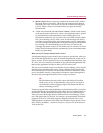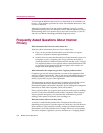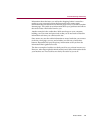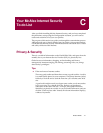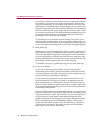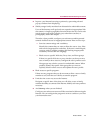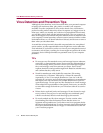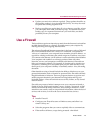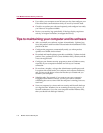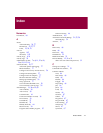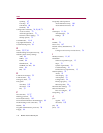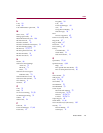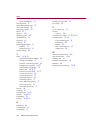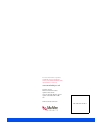
Product Guide 115
Your McAfee Internet Security To-do List
n Update your anti-virus software regularly. These updates should be at
the least the product's virus signature files (DATs). You may also need
to update the scanning engine as well.
n Back up your files on a regular basis. If a virus destroys your files, at least
you can replace them with your back-up copy. You should store your
backup copy in a separate location from your work files, one that is
preferably not on your computer.
Use a Firewall
The best defense against an intrusion or attack from the Internet is to install an
invisible barrier known as a firewall. Firewalls protect your computer by
filtering incoming and outgoing Internet traffic.
The advent of broadband Internet connections in the home, such as Cable and
DSL, has manifested itself as the "always on" connection. To maintain its
"always on" connection, your computer must maintain a fixed IP address - as
opposed to a dialup connection, that which assigns an IP address every time
you connect to the Internet. (An IP address is a network address that identifies
your computer and enables it to exchange packets of data with other
networks, servers, and computers connected to the Internet.) Firewalls can
hide your computer's identity. For example, if a hacker tries to invade your
computer by scanning for a susceptible open port, the data returned, if any
that exposes your computer's identity is essentially useless - thus, thwarting
the attack.
Other benefits to using a firewall include the ability to block access to your
personal information such as financial or password files. Firewalls can block
illegal distribution of software. There are programs known as spyware and
stealth programs that track your Internet browsing habits and log your
keyboard strokes. A firewall can block access to files, folders, or any shared
network device.
Firewalls can prevent a hacker's attempt to use your computer to launch a
Denial of Service (DoS) attack against a server, web site, or network. A DoS
attack overwhelms the entity's resources, thus causing a shutdown. A DoS
attack does not usually result in compromised information, rather the loss of
services and revenue, as well as the cost to restore the lost services.
Tips
n Install a Firewall.
n Configure your Firewall to start as Windows starts; and allow it to
remain "always on."
n Select the programs that you want to explicitly allow to communicate.
n Filter traffic at all times, except during an attack - then block.



